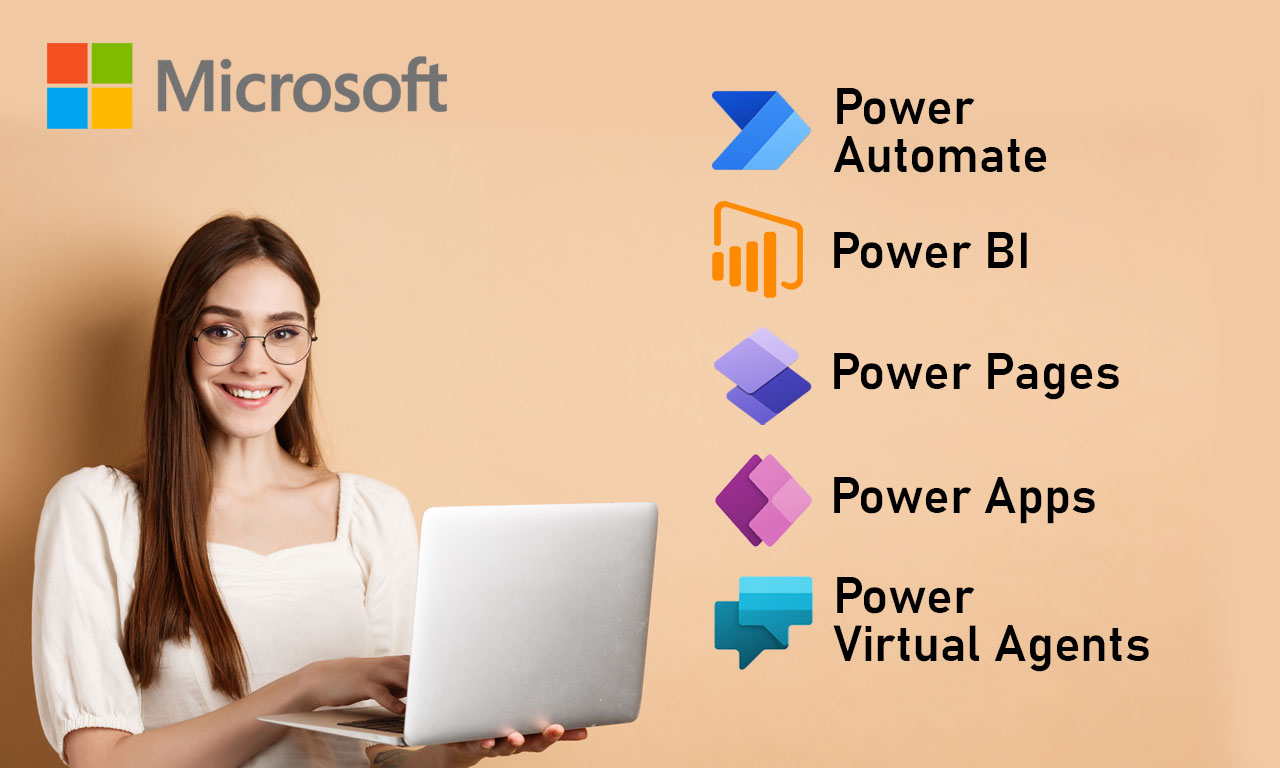
Modern enterprises are under constant pressure to deliver faster, smarter, and more flexible digital solutions. Long development cycles and heavy reliance on IT teams often slow down progress, leaving organizations struggling to keep pace with innovation. Microsoft Power Platform changes that reality by offering a low-code environment where businesses can automate workflows, analyze data, and build applications with speed and agility.
What is Microsoft Power Platform?
Microsoft Power Platform is a suite of applications that enables organizations to analyze data, build solutions, automate processes, and create virtual agents with little to no coding. It includes:
- Power BI – for interactive data analytics and business intelligence.
- Power Apps – for creating custom applications quickly.
- Power Automate – for streamlining workflows and automating repetitive tasks.
- Power Virtual Agents – for building AI-driven chatbots.
- Power Pages – for building secure, low-code business websites.
- Copilot Studio – for integrating AI-powered assistance into workflows.
Together, these tools offer a flexible and scalable way to accelerate enterprise transformation.
Key Benefits of Microsoft Power Platform
- Low-Code Development – Reduces dependency on professional developers, empowering business users (citizen developers) to create apps and solutions.
- Faster Time-to-Market – Enterprises can deliver digital solutions more quickly compared to traditional development.
- Cost Efficiency – Saves on development resources while reducing operational inefficiencies.
- Data-Driven Decisions – Power BI provides real-time insights across business units.
- Seamless Integration – Works with Microsoft 365, Dynamics 365, Azure, and numerous third-party services.
- Agility and Scalability – Businesses can adapt and scale solutions as needs evolve.
Use Cases in Enterprises
Microsoft Power Platform empowers organizations with a wide range of capabilities, from automating repetitive workflows through Power Automate to building custom applications with Power Apps tailored to departmental needs. It enhances customer experiences using Power Virtual Agents for instant support, while Power BI delivers insightful dashboards that help executives make informed decisions. Additionally, AI integration through Copilot and other advanced tools streamlines processes and provides predictive insights, enabling businesses to operate with greater efficiency and agility.
How Microsoft Power Platform Speeds Up IT Modernization
Traditional IT modernization projects are often costly and time-consuming, but Microsoft Power Platform helps reduce these challenges by enabling rapid prototyping, minimizing IT bottlenecks, enhancing collaboration through integrations with Microsoft Teams, SharePoint, and Outlook, and supporting digital transformation goals by aligning IT with business objectives to drive greater agility and scalability.
Challenges and Best Practices
While Microsoft Power Platform delivers significant benefits, enterprises must also address challenges like governance, security, and user adoption. To ensure success, organizations should establish clear governance frameworks, provide training for teams, and align Power Platform projects with broader digital transformation strategies.
Microsoft Power Platform is more than just a low-code toolkit—it is a powerful engine for enterprise modernization. By simplifying development, automating workflows, and enabling better decision-making, it equips businesses with the agility needed to thrive in today’s competitive environment.
FAQs
1. What is Microsoft Power Platform?
Microsoft Power Platform is a collection of low-code tools—including Power BI, Power Apps, Power Automate, Power Virtual Agents, and Power Pages—that allow businesses to analyze data, build applications, automate workflows, and create virtual agents. It helps organizations accelerate digital transformation with minimal coding requirements.
2. What is Power Platform Microsoft?
Power Platform Microsoft is a suite of low-code applications designed to empower businesses with data insights, automation, and app development.
3. What platforms does Microsoft Power BI support?
Microsoft Power BI supports web browsers, Windows desktop, mobile apps for iOS and Android, and integrates with Microsoft Teams and SharePoint.
4. What is the Microsoft Power Platform?
The Microsoft Power Platform is a low-code development suite that helps businesses innovate by using data analysis, automation, and app creation tools.
5. Is Power Platform part of Microsoft 365?
Yes. Microsoft Power Platform integrates seamlessly with Microsoft 365, providing deeper collaboration and access to data across the enterprise ecosystem.

